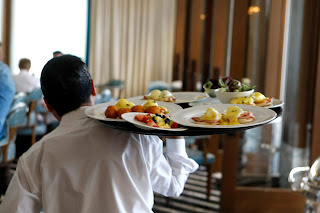Working While Your Sick; A Way Of Life For Hospitality Employees
A Chicago restaurant worker recalls a time he was sick but felt he had to work or else be fired: "It was an incredibly busy weekend," he said, "at one point, one of my fellow workers sat me down because I was about to faint. The smell of grease and a long shift had taken their toll. I spent the next five days vomiting, expectorating phlegm and drinking a lot of orange juice. I had to force my co-workers to cover for me and work double shifts. They didn't want to see me fired, and I didn't want to lose my job. Later that week, two of my co-workers caught my virus as well as quite a few customers."
Stories such as these are scattered throughout "Serving While Sick," a report on the health, safety and healthcare of restaurant workers in the U.S., put out by the Restaurant Opportunities Centers United, a New York-based national restaurant workers' organization that supports higher wages and better work conditions for restaurant employees. The report, released today, is based on 4,323 surveys of restaurant workers across the country, plus 240 employer interviews. The report also includes results from 500 more worker surveys and 20 additional interviews with employers on health insurance needs.
Regarding risks that restaurant workers encounter, 36.1% said it was unsafely hot in the kitchen, 25.2% said there were fire hazards in the restaurant and 38.1% said they had done something that put their own safety at risk. In addition, 66.6% of workers said they didn't know worker compensation laws and 33% said they never underwent health and safety training provided by employers.
Among injuries sustained on the job, 45.8% of workers were burned, 49% were cut and 24.5% had contact with toxic chemicals. As for workplace practices, 38.1% said time pressures caused them to do something that put their own safety and health at risk, and 42.5% said that time constraints caused them do so something that may have harmed the health and safety of customers.
Most workers surveyed said taking time off when sick was difficult. Almost 90% of restaurant employees said they don't get paid sick days, nearly 80% said they don't get paid vacation days and about 64% said they've worked while sick.
Quotes from anonymous workers sprinkled throughout the report relay similar messages: Most workers don't take time off when sick because they won't get paid and they fear that too much time taken off will result in being fired.
The vast majority of workers, 89.7%, don't get health insurance through their employer. About 62% don't have any health insurance and about 23% had gone to the emergency room but weren't able to pay the bill.
On the employer side, there was a general agreement that health insurance was essential for current employees and important for hiring and keeping potential workers.
It should come as no surprise that almost half of the restaurant workers surveyed were foreign-born. About 15% said they were undocumented workers.
The report's policy recommendations included giving workers benefits such as paid sick days and healthcare, providing health and safety training, and improving health and safety conditions in restaurants.
-- Jeannine Stein / Los Angeles Times
Stories such as these are scattered throughout "Serving While Sick," a report on the health, safety and healthcare of restaurant workers in the U.S., put out by the Restaurant Opportunities Centers United, a New York-based national restaurant workers' organization that supports higher wages and better work conditions for restaurant employees. The report, released today, is based on 4,323 surveys of restaurant workers across the country, plus 240 employer interviews. The report also includes results from 500 more worker surveys and 20 additional interviews with employers on health insurance needs.
Regarding risks that restaurant workers encounter, 36.1% said it was unsafely hot in the kitchen, 25.2% said there were fire hazards in the restaurant and 38.1% said they had done something that put their own safety at risk. In addition, 66.6% of workers said they didn't know worker compensation laws and 33% said they never underwent health and safety training provided by employers.
Among injuries sustained on the job, 45.8% of workers were burned, 49% were cut and 24.5% had contact with toxic chemicals. As for workplace practices, 38.1% said time pressures caused them to do something that put their own safety and health at risk, and 42.5% said that time constraints caused them do so something that may have harmed the health and safety of customers.
Most workers surveyed said taking time off when sick was difficult. Almost 90% of restaurant employees said they don't get paid sick days, nearly 80% said they don't get paid vacation days and about 64% said they've worked while sick.
Quotes from anonymous workers sprinkled throughout the report relay similar messages: Most workers don't take time off when sick because they won't get paid and they fear that too much time taken off will result in being fired.
The vast majority of workers, 89.7%, don't get health insurance through their employer. About 62% don't have any health insurance and about 23% had gone to the emergency room but weren't able to pay the bill.
On the employer side, there was a general agreement that health insurance was essential for current employees and important for hiring and keeping potential workers.
It should come as no surprise that almost half of the restaurant workers surveyed were foreign-born. About 15% said they were undocumented workers.
The report's policy recommendations included giving workers benefits such as paid sick days and healthcare, providing health and safety training, and improving health and safety conditions in restaurants.
-- Jeannine Stein / Los Angeles Times



Where do you get these lies suggesting that certain types of people can legally participate in a tip pool?
ReplyDeleteTips are the customer's private property. Don't you see that what you are suggesting is that someone, other than the customer, is authorized to determine who the customer's tip belongs to?
I don't know why you are lying about certain types of employees being eligible to legally share in the cusotmer's tip, but I can tell you this. Tips belong to the customer. No one, other than maybe the employee who the customer chose to tip is authorized to appropriate the customer's tip to other workers.
So again, who is deciding this matter concerning who can receive a share of the customer's tip. Please give me the name of the person who is fraudulently suggesting that they are authorized to determine who the customer's tip belongs to.
Here is the deal. Neither Federal laws nor state laws can define certain types of employees as being legally eligible to share in the customer's tip. The reason is, our constitution prohibits any law that infringes on the liberties and rights of our citizens in such a manner. If someone has told you that federal or state laws define who can legally be included in a tip pool, then they are misconstuing the law.
ReplyDeleteTip pooling is the appropriating of the customer's private property. Only the person whom the customer chose to tip is authorized to appropriate the customer's tip.
Those who have suggested that certain types of employees can legally be included in the sharing of tips have not been authorized by customers to appropritate their tips in such a manner. Do you understand. Whoever told you that certain types of employees could legally share in each and every tip a customer presents was lying. Only the customer who presents a tip can say who can or can't share in his tip. It's the customer's property.
Now let me tell you why these lies are being propagated. Business owners want to be able to use the customer's tip to pay their employees. Business owners know that if they use customer tips, instead of the income actually generated from their business to pay their workers, they will make more profits for themselves. The problem is, these busienss owners are simply stealing the customer's private property.
To get around the law the National Restaurant Association has set up one of the biggest lobbying efforts in Washington D.C. They figure that if they can bribe enough people up high in our government, restaurants can get away with stealing the customer's private property indefinately.
Now there is the truth.
George,
ReplyDeleteI agree that tips belong to the waiter. However, is it your position that waiters should not have to tip out employees who help them earn the tip; ie Bussers? I worked as a waiter for 15 years and I believe a good busser is worth his/her weight in gold.
As for "who says waiters have to share their tips" please read the case of Cumbie v. Woody Woo; http://www.ca9.uscourts.gov/datastore/opinions/2010/02/23/08-35718.pdf
You are VERY right that restaurants lobby politicians to increase their bottom line. Restaurant workers need to start doing the same. There are many more employees than there are restaurant owners. Wanna help?
The resource that you mentioned here is something that I have been looking from quite a time. And finally it ended with such a nice blog post. Don’t have words to thank you. Restaurants In Delhi
ReplyDelete